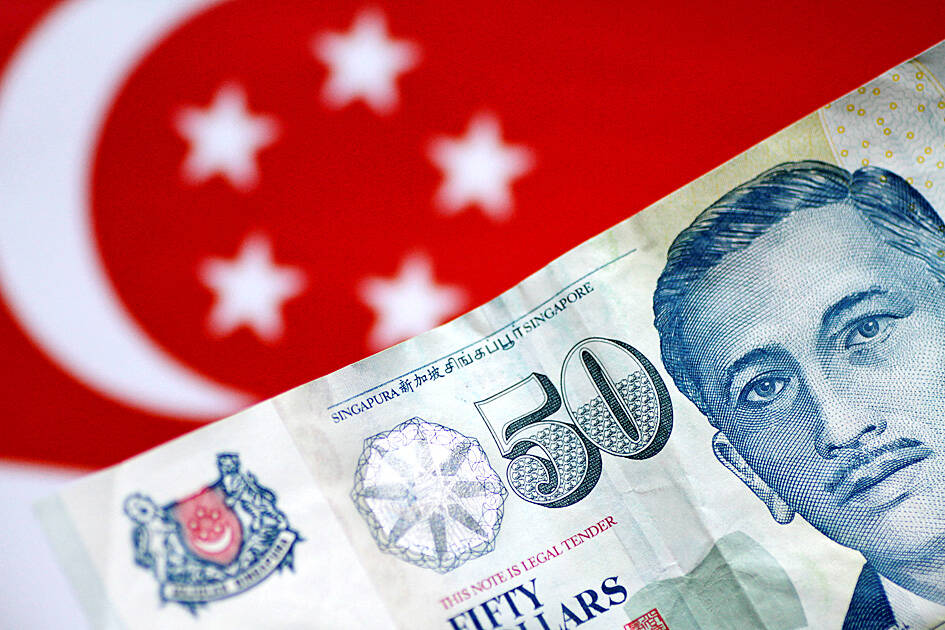The Singapore dollar this year has established itself as Asia’s most resilient currency against the US dollar, and some strategists are betting on more strength if price pressures force the nation’s central bank to tighten its exchange-rate policy again next month.
Goldman Sachs Group Inc, Citigroup Inc and MUFG Bank Ltd are among banks that are bullish on the currency, underpinned by an expectation that the Monetary Authority of Singapore (MAS) could extend policy tightening at its October meeting to help rein in core inflation, which hit a 14-year high in July.
The predictions come as almost every major currency retreats against the dollar, with the US Federal Reserve set on an aggressive rate-hike cycle. While the MAS has turned the nation’s currency into a winner against peers in Asia, it is still down more than 4 percent against the US dollar this year.

Photo: Reuters
MUFG Bank puts the likelihood of additional tightening by the MAS next month at 50 percent, which could translate into a gain of more than 1 percent for the local currency versus the US dollar over the following months, according to Jeff Ng, a currency strategist at MUFG Bank in Singapore.
“Our call of a Singapore dollar rebound is premised on most of the Fed’s eventual rate hikes already being priced into markets now,” he said.
MUFG forecasts the Asian currency rising to S$1.38 against the US dollar by the end of this year. It closed last week at S$1.407.
Unlike most central banks that use interest rates to guide policy, the MAS responds to rising core inflation by guiding the local dollar higher against a basket made up of the currencies of its major trading partners. The central bank focuses on the level of the Singapore dollar’s nominal effective exchange rate, which it allows to move within a policy band.
Still, even if the MAS does extend its policy tightening for a fourth time this year, there is no guarantee that the local currency would rally against the US dollar. The Singapore dollar earlier this month slumped to its lowest level in more than two years, before paring this year’s decline to 4.1 percent by the end of last week.
“Despite the MAS tightening, USD/SGD has continued to inch higher amidst a broad USD rally supported by a hawkish Fed, geopolitical tensions and a slowdown in China’s growth,” Divya Devesh, head of ASEAN and South-Asia FX research at Standard Chartered Bank SG Ltd in Singapore, wrote in a note yesterday.

BYPASSING CHINA TARIFFS: In the first five months of this year, Foxconn sent US$4.4bn of iPhones to the US from India, compared with US$3.7bn in the whole of last year Nearly all the iPhones exported by Foxconn Technology Group (富士康科技集團) from India went to the US between March and last month, customs data showed, far above last year’s average of 50 percent and a clear sign of Apple Inc’s efforts to bypass high US tariffs imposed on China. The numbers, being reported by Reuters for the first time, show that Apple has realigned its India exports to almost exclusively serve the US market, when previously the devices were more widely distributed to nations including the Netherlands and the Czech Republic. During March to last month, Foxconn, known as Hon Hai Precision Industry

Taiwan Semiconductor Manufacturing Co (TSMC, 台積電) and the University of Tokyo (UTokyo) yesterday announced the launch of the TSMC-UTokyo Lab to promote advanced semiconductor research, education and talent development. The lab is TSMC’s first laboratory collaboration with a university outside Taiwan, the company said in a statement. The lab would leverage “the extensive knowledge, experience, and creativity” of both institutions, the company said. It is located in the Asano Section of UTokyo’s Hongo, Tokyo, campus and would be managed by UTokyo faculty, guided by directors from UTokyo and TSMC, the company said. TSMC began working with UTokyo in 2019, resulting in 21 research projects,

Taiwan’s property market is entering a freeze, with mortgage activity across the nation’s six largest cities plummeting in the first quarter, H&B Realty Co (住商不動產) said yesterday, citing mounting pressure on housing demand amid tighter lending rules and regulatory curbs. Mortgage applications in Taipei, New Taipei City, Taoyuan, Taichung, Tainan and Kaohsiung totaled 28,078 from January to March, a sharp 36.3 percent decline from 44,082 in the same period last year, the nation’s largest real-estate brokerage by franchise said, citing data from the Joint Credit Information Center (JCIC, 聯徵中心). “The simultaneous decline across all six cities reflects just how drastically the market

Ashton Hall’s morning routine involves dunking his head in iced Saratoga Spring Water. For the company that sells the bottled water — Hall’s brand of choice for drinking, brushing his teeth and submerging himself — that is fantastic news. “We’re so thankful to this incredible fitness influencer called Ashton Hall,” Saratoga owner Primo Brands Corp’s CEO Robbert Rietbroek said on an earnings call after Hall’s morning routine video went viral. “He really helped put our brand on the map.” Primo Brands, which was not affiliated with Hall when he made his video, is among the increasing number of companies benefiting from influencer